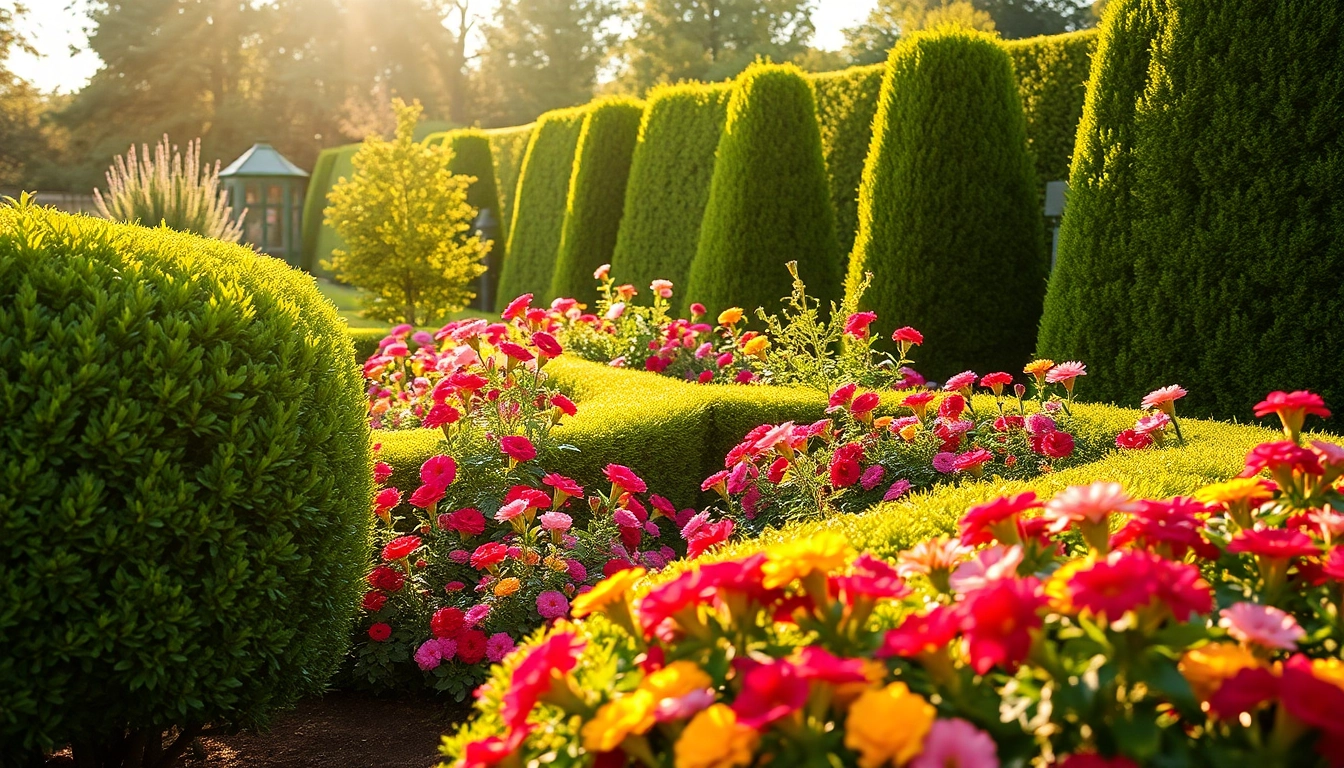Understanding Garden Maintenance Services
What is Garden Maintenance?
Garden maintenance involves the range of practices required to keep a garden healthy, tidy, and aesthetically pleasing. It encompasses various tasks, including regular mowing, pruning, weeding, planting, and pest control. The goal is not only to enhance the visual appeal of the landscape but also to ensure that plants, flowers, and other components thrive in their environment. By engaging a garden maintenance service, homeowners can ensure that their gardens receive professional care tailored to their specific needs and conditions.
Benefits of Regular Maintenance
Regular garden maintenance offers numerous benefits that extend beyond mere aesthetics. Here are some key advantages:
- Promotes Plant Health: Continuous care helps to prevent diseases, control pests, and ensure adequate nutrition levels for plants.
- Enhances Curb Appeal: A well-maintained garden boosts the property’s visual appeal, making it more inviting to guests and potential buyers.
- Increases Property Value: Attractive landscaping can significantly raise property values, which is particularly beneficial if the homeowner intends to sell.
- Provides a Relaxing Environment: A beautiful garden creates a serene space for relaxation and enjoyment, enhancing overall well-being.
- Minimizes DIY Stress: Regular professional maintenance reduces the burden on homeowners to manage their gardens themselves, allowing them to enjoy their outdoor space more fully.
Types of Services Offered
Garden maintenance services vary widely, catering to different requirements and preferences. Commonly offered services include:
- Lawn Care: This includes mowing, aerating, fertilizing, and seeding lawns to keep them lush and healthy.
- Landscape Design and Installation: Professional services often assist in designing and installing new garden layouts, incorporating elements such as flower beds, pathways, and water features.
- Pruning and Trimming: This service ensures plants are shaped correctly and promotes new growth while removing damaged or dead branches.
- Weeding and Pest Control: Regular weeding prevents invasive species from taking over, while pest control services protect against damaging insects and diseases.
- Seasonal Clean-Up: This includes tasks like leaf removal in the fall and preparing gardens for winter, as well as spring clean-ups to kickstart growth.
Choosing the Right Garden Maintenance Service
Factors to Consider When Hiring
Selecting the right garden maintenance service can be a daunting task due to the variety of options available. Here are key factors to consider:
- Expertise and Experience: Look for companies with a proven track record and qualified staff. Their experience can make a significant difference in the quality of service.
- Reputation: Research online reviews and testimonials from past clients to gauge service quality and reliability.
- Services Offered: Ensure that the company provides the specific services you need, whether it’s regular maintenance, landscaping, or specialized care.
- Pricing Structure: Obtain detailed quotes and understand the pricing model, including whether charges are hourly, per project, or based on contracts.
- Availability: Confirm that the company can accommodate your scheduling needs and is available for emergency services if required.
Questions to Ask Potential Providers
When interviewing potential garden maintenance services, asking the right questions can help clarify what type of service you can expect. Consider these inquiries:
- What specific services do you offer?
- How will you customize your approach for my garden’s unique conditions?
- Can you provide references from previous customers?
- What kind of training or certifications do your staff possess?
- Do you have liability insurance and are you licensed to operate in my area?
Assessing Customer Reviews and Ratings
Customer reviews and ratings provide invaluable insights into a garden maintenance service’s reliability and quality. Use platforms like Google Reviews, Yelp, and social media to:
- Gauge Overall Satisfaction: Look for trends in feedback—are most customers satisfied with the service?
- Identify Common Concerns: Are there recurring complaints about tardiness, quality of work, or customer service?
- Check for Responsiveness: How does the company respond to negative feedback? A professional response can indicate a commitment to customer service.
Best Practices for DIY Garden Maintenance
Essential Tools and Equipment for Garden Care
For those who prefer to handle garden maintenance themselves, having the right tools is crucial. Here’s a list of essential equipment:
- Lawn Mower: Necessary for keeping grass at a manageable height.
- Pruning Shears: Handy for shaping plants and removing dead branches.
- Trowel: Useful for planting, weeding, and digging in small spaces.
- Rake: Ideal for leaf collection and soil aeration.
- Garden Hose: Essential for watering plants, especially during dry spells.
- Gloves: Protect your hands while providing grip for tool use and plant handling.
Seasonal Maintenance Tasks
Maintaining a garden requires different tasks in different seasons. Here are some season-specific activities:
- Spring: Clean up winter debris, prune trees and shrubs, and prepare flower beds for planting.
- Summer: Regularly water and fertilize plants, control weeds, and deadhead flowering plants.
- Fall: Rake leaves, plant bulbs for spring bloom, and protect sensitive plants from winter frost.
- Winter: Plan for the next growing season, apply mulch for insulation, and maintain tools.
Common Mistakes to Avoid
Even avid gardeners can succumb to common pitfalls. Here are several mistakes to watch for:
- Neglecting Soil Health: Failing to test and amend soil can lead to poor plant health and reduced yields.
- Overwatering: Too much water can damage plants, leading to root rot and disease.
- Ignoring Pest Control: Allowing infestations to grow can devastate a garden; regular checks are essential.
- Lack of Planning: Starting without a clear plan can result in disorganized and unsuccessful landscapes.
Innovative Trends in Garden Maintenance
Eco-Friendly Practices in Landscaping
Modern garden maintenance is increasingly focusing on sustainability. Eco-friendly practices include:
- Organic Gardening: Utilizing natural pest controls, organic fertilizers, and soil amendments improves plant health without harmful chemicals.
- Native Plant Landscaping: Incorporating native plants can reduce water usage and attract beneficial wildlife.
- Composting: Composting kitchen and yard waste creates nutrient-rich soil while reducing landfill contributions.
The Role of Technology in Garden Care
Technology is revolutionizing garden maintenance. Innovations include:
- Smart Irrigation Systems: These systems adjust watering schedules based on weather conditions, minimizing water waste.
- Drone Technology: Drones can survey large areas, helping identify issues like weed infestations or areas requiring attention.
- Garden Management Apps: Various apps assist with planning, tracking growth, and scheduling regular maintenance tasks.
Sustainable Gardening: Tips and Techniques
Sustainable gardening practices can improve the health of the environment as well as your garden. Here are effective techniques:
- Crop Rotation: Alternating crops each season prevents soil depletion and controls pests.
- Companion Planting: Certain plants can benefit each other when planted together, enhancing growth and reducing pest issues.
- Mulching: Using organic mulch helps retain moisture, suppress weeds, and enrich the soil as it decomposes.
Measuring the Impact of Garden Maintenance
Key Performance Indicators for Your Garden
To determine the effectiveness of garden maintenance, several key performance indicators (KPIs) can be used:
- Plant Health: Assessing the vitality and growth rate of plants can indicate successful maintenance.
- Weed Density: A decline in weed presence signifies effective control measures.
- Pest and Disease Incidence: Monitoring these rates helps evaluate the effectiveness of pest control strategies.
Enhancing Property Value Through Maintenance
Regular, professional garden maintenance can significantly enhance property values. Here’s how:
- Increased Aesthetic Appeal: Well-maintained gardens create attractive first impressions, crucial for prospective buyers.
- Functional Outdoor Spaces: Gardens designed for utility and enjoyment—such as outdoor kitchens, seating areas, or garden paths—add value.
- Long-Term Health of Landscape: Healthy and vibrant landscapes, maintained over time, lead to lower future costs and repairs.
Case Studies of Successful Garden Upgrades
Examining successful garden upgrades can offer inspiration and practical insight. Here are a few examples:
- Case Study 1: A suburban home implemented a native plant landscaping overhaul, reducing water consumption by 50% and increasing property value by 20% within two years.
- Case Study 2: An urban apartment building added a rooftop garden with eco-friendly practices, enhancing tenant satisfaction and attracting new renters, thus increasing rental income by 15%.
- Case Study 3: A family home upgraded their garden with smart irrigation technology, leading to a 40% reduction in water bills while improving plant health significantly.



